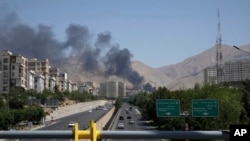“Unfortunately, I must note that in the last few days of conflict our economic entities have already had some problems,” Papoyan told lawmakers in Yerevan. “Some cargos are stuck in the [Iranian] port of Bandar Abbas while others are stuck on roads. So we are having problems with exports, and our importers, who import things from Iran or through Iran, are having many problems too.”
“We hope that the conflict between the two countries will end and we will be able to continue carrying unfettered trade through friendly Iran as we did before,” he said.
Papoyan said nothing about the monetary or physical amount of the shipments affected by the conflict triggered on June 13 by Israeli strikes on Iranian nuclear facilities and military sites.
Iran is one of landlocked Armenia’s two commercial conduits to the outside world. According to various estimates, up to one-third of Armenian foreign trade is carried out through Bandar Abbas and other Iranian ports.
Finance Minister Vahe Hovannisian also warned of the economic cost of the continuing conflict for the South Caucasus country. Speaking in the afternoon, he confirmed that the Armenian government has not yet discussed possible responses to the disruption.
The government was quick to condemn the Israeli strikes. Foreign Minister Ararat Mirzoyan spoke to his Iranian counterpart Abbas Araghchi by phone on Saturday.
The logistical problems in Iran are compounded by ongoing major obstacles to Armenia’s even more vital cargo transit through neighboring Georgia. In late April, Georgian authorities introduced, for still unknown reasons, physical checks on some of Armenia’s multimillion-dollar exports of brandy to Russia. The declared checks take many weeks, leaving dozens of Armenian trucks stuck at Georgian customs terminals.
The Armenian customs service decided on June 10 to ban other commercial trucks from crossing into Georgia until the end of the vehicle “congestion” there. It is still not clear when it will lift the ban. Papoyan indicated on Monday a continuing lack of progress in Armenian government efforts to have the transport hurdles removed.




